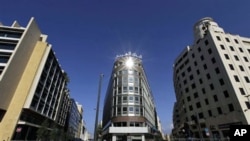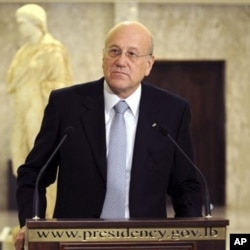Lebanon may not have the smoothest of histories, but its economy seems to know how to weather a political storm. After a somewhat bumpy transfer of power last month from one billionaire businessman to another, economists say the country appears on track to maintain its open-market economic policies.
With a public debt of more than $53 billion and a $3 billion deficit, this small Mediterranean nation of 4 million people has some outsized economic issues. But its fiscal challenges have recently been overshadowed by political questions.
The pro-Western government of Prime Minister Saad Hariri collapsed in mid-January, when the Hezbollah-led opposition withdrew from the Cabinet because of disagreements about the U.N.-backed tribunal investigating the 2005 assassination of Mr. Hariri’s father, a five-time Lebanese prime minister.
After some political bickering, a new prime minister secured the job last week with the support of Hezbollah and other opposition blocs in parliament. Najib Mikati is a 55-year-old telecoms tycoon with a Western education. Some in Lebanon fear he will be beholden to his pro-Syrian and pro-Iranian backers.
New prime minister a moderate
But American University in Beirut economics professor Samir Makdisi says Mr. Mikati is a moderate in both his economic and political thinking. He says the new prime minister is unlikely to deviate from the current economic course, which saw 8 percent growth last year and a slight fall in the debt and deficit.
“When the Syrians were here, they did not really interfere in economic policy - this is not their interest, this is not their focus and I do not think it is even that much their expertise," he said. "I do not see them at all interfering in issues that have to do with economic and financial policies - except the general rhetoric that we have to take care of the poor, we have to take care of the social, but everyone says that. I don't see him [Mikati] beholden to them on matters of economic policy issues.”
More importantly perhaps, market watchers will be waiting to see what kind of government Mr. Mikati appoints - one of politicians or technocrats - and to see how qualified his finance minister is perceived to be.
“So it seems that the markets are giving the new prime minister a kind of a grace period to see what kind of a government would be formed, what kind of policy statement we are going to have, and on a practical basis, how will be the political climate in Lebanon over the next few months. I think that this is very important as far as the private confidence factor is concerned,” he said.
Dominance of private sector
Barakat says the Lebanese economy is driven by the private sector, which accounts for 80 percent of the Gross Domestic Product. He says confidence levels are closely tied to political developments and could dictate the pace of economic growth.
“It is the private sector that is [the] generator of economic value added in Lebanon," he said. "All what is needed on behalf of the government is to tighten their belts as much as possible and send the right signals to the private sector for the private sector to invest and consume more and generate more economic value added and drive growth. It is a private-sector economy par excellence.”
Solid banking system
Barakat says that financially, Lebanon’s banking system is one of the strongest in the world with very high liquidity - a strong buffer in turbulent times.
Last week the global credit rating agency Standard & Poor’s downgraded Lebanon’s outlook from “positive” to “stable” because of the political crisis. So how can the new government reassure international investors that Lebanon is not too risky? Makdisi says it is all about economic stability.
“To be extremely clear about his [Prime Minister Mikati’s] macroeconomic blueprint that he’s going to take; the fact that he is going to be controlling the public debt," he said. "The fact that he is going to continue to encourage foreign investment to come in - after all this is basically a free economy. This has always been the case throughout Lebanon's post-independence history. The fundamentals of macroeconomic policy have not really changed.”
Makdisi concludes that Lebanon's macroeconomic imbalances must be taken into account and resolved. If the new government will find a way to settle them, or at least institute policies that attempt to resolve them, it should be an encouraging signal to investors.










